In The Eye Of The 'Tempo Storm'
What does it take to eat, sleep and train with a professional eSports team? For one thing, it takes a lot of milk — and, big surprise, no women.
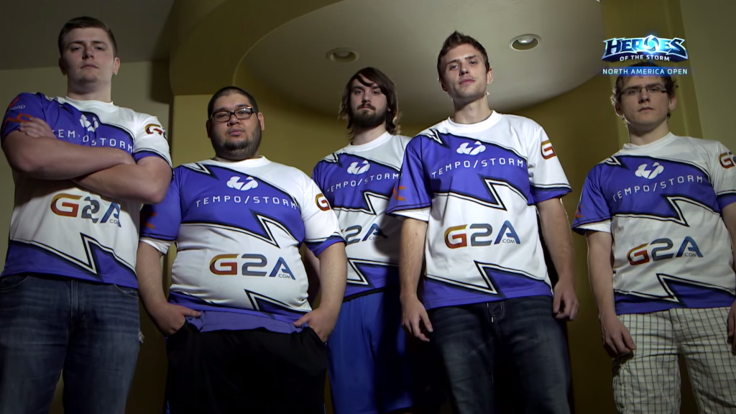
The blinds are closed, the lights are on and the air conditioning is pumping into the second floor of a rented five-bedroom home in suburban Phoenix. Anime posters and an “Assassin’s Creed 3” flag adorn yellow walls. Five guys in their 20s sit at white folding tables, bathed in blue light, staring at their computer screens and talking to each other intermittently, their voices calm over frantic clicks on their keyboards and mice.
“Can someone go mid, quick?”
“I’m going.”
“Fighting for top again.”
These men are living a version of basically every 14-year-old gamer’s fantasy. They are paid to play video games and live in a house together – they are a team of professional gamers.
The team, known as Tempo Storm, are playing their sport “Heroes of the Storm” (also known as Heroes or HotS), a multiplayer online game in which two teams of five go up against each other on various maps, meeting objectives and killing enemy “minions” and team members to gain strength and try to destroy the enemy core, winning the game.
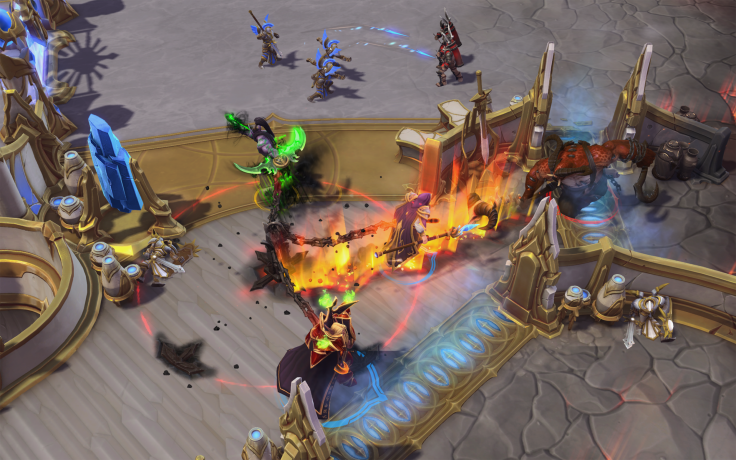
This is their full-time job - and they are good at it, often being called the best in North America. Competing at such a high level means they spend a lot of their time practicing, or “scrimming,” against other teams both in the U.S. and overseas - sometimes they even scrim each other. Their schedule varies week to week, but they often work all seven days, practicing anywhere from three to eight hours every day.
“We’ve been doing this for the last year, so it’s just normal,” says Taylor “Arthelon” Eder. “I’m more surprised when we have days off.”
As with any demanding job, and surely like any professional athlete, the work-life balance tips heavily toward work. SuperData Research estimates there are 1,400 gamers worldwide who play competitively as their main activity. Of those, an estimated 900 earn a “substantial income” from gaming, as in they do it for a living. And SuperData’s team of analysts estimates there are 300 people living in team houses where they eat, sleep and play together.

This is the story of five, living on a nondescript street in an otherwise family-oriented block. Wade “Dreadnaught” Penfold, 22, team captain and shot caller, put college on hold to pursue this full time. The youngest member at 20 is Eder, who is also the tallest at 6-foot-7. The oldest is Josh “So1dier” Miller, 27, a onetime competitive console gamer who flipped to PC gaming. Kurt “Kaeyoh” Ocher, 24, the so-called “normal” one, is a former piano performance major. The newest member, also 24, is Chris “Zuna” Buechter, who has lived in a team house before and comes from a highly competitive gaming background.
If you’re wondering why everyone has at least three names in this story it’s because most are better known -- indeed pretty much only known among gamers -- by their nicknames or handles.
Eat, Sleep, Scrim
Each member of the team is on a slightly different daily schedule, but they all wake up before practice starts, often around noon -- although the time can vary a lot. They will then scrim for around three hours, take an hour break for lunch and then scrim for another three hours.
After practice, they will either go over replays of their games or take some time out to go to dinner together, before jumping on the live video streaming platform Twitch to play the game and interact with fans, streaming anywhere from two hours up to around five. Some days they have a shorter practice schedule or no stream time so they can work on gameplay videos and other content for the Tempo Storm website.
With prize money escalating rapidly and major sponsors like HTC and Nissan getting involved, eSports is big business. This year alone it is estimated to generate $612 million in sponsorships, merchandise and ticket sales worldwide, with $143 million of that in the U.S., according to SuperData Research.
One of “Heroes of the Storm’s” top competitors in the multiplayer online genre, “DotA 2,” had its fifth international competition, “Ti5,” two weeks ago, with a total prize pool exceeding $18.4 million; the first-place winner (an American team called Evil Geniuses) took away $6.6 million alone. In March and April, “Heroes of the Storm” publisher Blizzard Entertainment held a college tournament called Heroes of the Dorm, with the finals airing on ESPN2.
As a sign that eSports is getting serious, the oldest league, the Electronic Sports League or ESL, announced on July 23 that it will start drug-testing players at its tournaments. In the past, gamers have been fairly open about their use of prescription drugs like Adderall (to enhance concentration) and marijuana (because gaming). Other forbidden substances like steroids are similar to those banned by the International Olympic Committee. The Tempo Storm team claims to be 100 percent drug-free.
Going Pro
The five members of the Tempo Storm “Heroes of the Storm” team have it pretty good; they signed with the Tempo Storm organization in January. “Heroes of the Storm” is a relatively new game from Blizzard, released to the public on June 2. Tempo Storm had been playing it for a year, dominating the alpha and beta testing. In March, they became the first “Heroes of the Storm” team to move into a group house.
Tempo Storm -- backed by their sponsors, Twitch, G2A, Namecheap and Func -- pays for the players' rent, utilities, food and travel expenses, as well as giving them a three-figure monthly salary on top for spending money.
The team manager is 24-year-old Jared “Zoia” Eggleston, a “caster” commentator on games (think Al Michaels, but for gaming). Eggleston lives in the house and takes care of things like making sure the team is awake for practice and entering them in tournaments.
“Zoia’s basically been the adult in the house,” says Andrey “Reynad” Yanyuk, the 23-year-old owner and CEO of Tempo Storm. “That’s important if you have a gaming house; it’s a bunch of kids who have probably never lived alone, or out of the house before. He’s there to make sure things don’t get too messy, the bills are taken care of on time and everything’s running smoothly.”
They also receive tournament winnings (of which Yanyuk says he has not yet taken a cut but can take 10 percent in the future, most likely if the prize pools get into the millions), as well as money from coaching lessons for people who want to learn more about the game, and a portion of the $4.99 for every person that subscribes to their Twitch channel. Some of the team members also run ads in between matches.
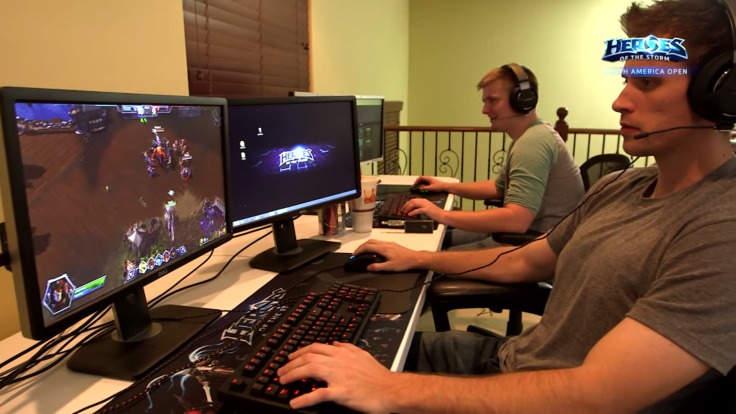
Taking time off is pretty much unheard of, with the exception of holidays like Christmas. “People are like, ‘well, you play video games for a living, it’s the dream.’ And it is. But sometimes it does have its negative, where you’re like, ‘Can I just not play this game today? Can I just play something else and we’ll call it a day?’” says Penfold.
While most of the team members are perfectly happy spending all their time grinding and getting better at the game, they also sometimes wish they had more time to go outside, spend time with friends and family and not think about playing. “I’m not near my parents at all. I come from Indiana, so I can’t just stop by and say hi -- and same goes for real life friends and siblings as well,” says Eder (the youngest, and tallest member of the team).
Viewers and casters (similar to traditional sports commentators) of their games often call them the best team in North America, putting this down to their high level of synergy. The team says it is because of the team house, and the fact that they spend pretty much all of their waking hours together, both in-game and out. Besides eating meals together they also do grocery shopping together -- mainly because they have only two cars, one of which is a minivan -- and go to the gym.
No Grills Allowed
The team also doesn’t spend a lot of time out of the house, estimating around 10 to 15 hours a week -- including gym time, which they count as going outside. But spending more time out of the house would mean sacrificing work hours, which they don’t really see as worth it.
“It’s not like we sit inside and aren’t doing anything, like, ‘Hopefully we play a videogame sometime today,’” says Penfold. “It would be cool to just hang out once in a while with, like, normal humans. Try and interact, you know, for just like an hour, not like a whole day’s worth, but just once in a while.”
This is most annoying for Penfold, who has a girlfriend, since women are practically banned from the house. Girls “aren’t very good for the team dynamic, they are a part of your personal interests -- not the teams,” he says. Whenever she visits Arizona -- they met in college in Wyoming, where she still studies -- she has to stay with his parents, who also live in Arizona.
“It’s pretty much grills, no-no,” Penfold says. Grill is Twitch-speak for girl. “It’s a struggle, for sure. Especially trying to explain like, ‘Oh yeah. I’m going to put a huge hindrance on our relationship just so I can go try and play video games.’ She’s very understanding of, like, ‘the dream’ and everything else, but it’s not the easiest thing in the world, that’s for sure.”
Despite getting fed up with their situation on occasion, the team says that overall living in the house has been really positive and definitely worked in their favor professionally. It doesn’t hurt that they live in a very spacious five-bedroom, three-bathroom house, complete with a putting green and pool in the backyard (which they often spend time in after a tournament win to celebrate).
Shower, Ramen, Game
They try to hit the gym every day, usually in groups of two or three and occasionally all together, and can spend up to two hours working out at any one time. When asked why, Miller says, “Because Kaeyoh goes ham" (hard as a m-----------), referring to Kurt Ocher, the pianist-turned-gamer.
Ocher jokingly said that if they were to have an equivalent of Gym Tan Laundry (GTL) from the MTV show “Jersey Shore” (which he has never actually watched), it would be SRG, or “Shower, Ramen, Game.”
Whenever they do get time off, they watch Netflix, and play video games -- including “Heroes of the Storm.” “It’s like, ‘What do we do when we’re not playing games?’ Well, we play more games,” says Ocher. This includes anything from “Battleblock Theatre” to “CounterStrike,” “Portals 2” and “World of Warcraft.”
One of the biggest differences between the Tempo Storm team and traditional professional sporting teams is that they don’t have a special diet. “Taco Bell still reigns free through our blood,” says Penfold, before admitting it would probably be better for the team if they had someone in the house to cook them healthier meals (which some professional eSports teams do have).
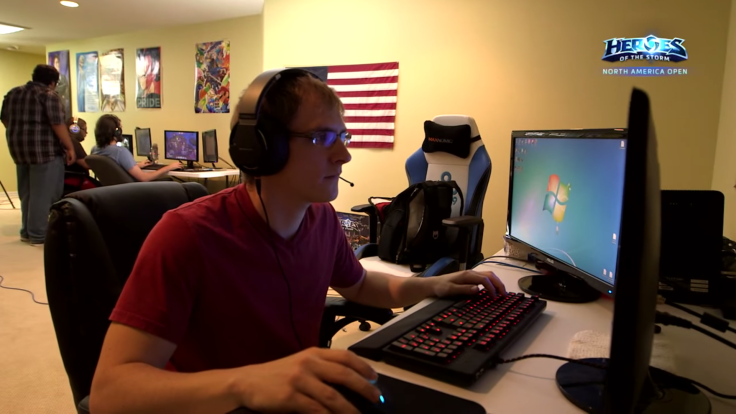
The team is now gearing up for two major tournaments -- the August Open on Saturday and Sunday, and the first-ever international “Heroes of the Storm” tournament, the MSI Masters Gaming Arena, which will be at PAX Prime in Seattle on Aug. 28-31.
MGA will be the first time Tempo Storm goes up against the best international teams in a public arena, in front of thousands of attendees and potentially millions of online viewers. “The weight of being in this position is very heavy,” says Ocher. Their reputation and that of the North American scene will be at stake -- which for the fans is everything.
"People are like, ‘well you play video games for a living, it’s the dream.’ And it is. But sometimes it does have its negative."
“Tempo Storm is actually a really unique team,” says Jake “SolidJake” Kulinski, a “Heroes of the Storm” caster and day one alpha player. He says they are the longest-standing “Heroes of the Storm” team in the world. “They have a very strict approach where they have to get along; they consider individual skill less important than being friends.”
While this is generally true, living and working together in the same house 24/7 does take its toll occasionally.
Demilitarized Fridge Zone
At the start of May the team almost fell apart, with members considering leaving because of “personality clashes.”
They had their first Tempo Storm roster change, removing Mike “Glaurung” Fisk from the team because he had “a lot of mentality issues that did not go well with the team, to the point that multiple players were contemplating wanting to leave the team,” said manager Eggleston in a YouTube video posted on May 20. He was quickly replaced by Buechter, who officially moved into the house on July 14, and according to Kulinski has “an ego bigger than mine, and he knows he does.”
Another flashpoint of conflict is fridge space, which in a house of six guys between the ages of 20-27 is a serious issue. It’s now at the point where they’re considering getting a second refrigerator.
“We have to talk about how many gallons of milk Kaeyoh gets every time he goes to the grocery store,” Penfold says. “He gets a lot of gallons of milk every time he goes. Like, if he’s down to one gallon of milk at the house he starts to panic, he starts sweating; he won’t even practice with us. He’s like, ‘Guys, I need milk in the house or I’m going to die.’”
“At one point, I think my worst, I tried to get four, and it was like not happening,” says Ocher. Penfold laughed so hard he looked like he was going to fall off his chair. “Four gallons of milk!”
“Yeah, it’s like, we have one fridge,” says Eder; he’s the biggest troll out of all of them.
“Wait, why the f--- do you need four gallons of milk? Do you drink like a gallon a day, a half-gallon? Like what the f---’s wrong with you?” says Buechter.
“He’s just on that milk grind, you know,” says Penfold.
Apparently the milk takes up 50 percent of the fridge space.
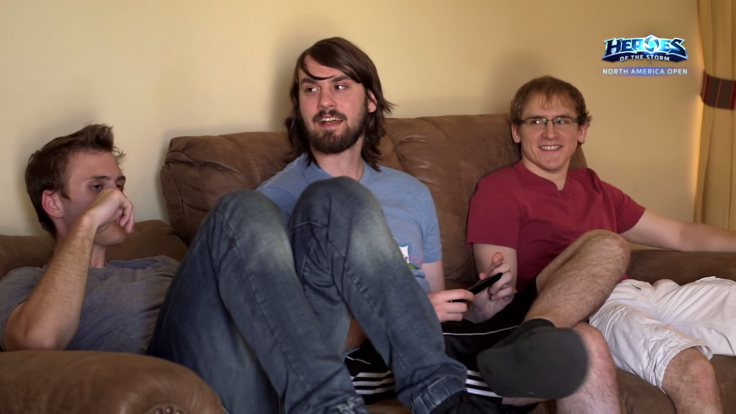
Personal Space
While Miller lives in the master bedroom closet -- which is easily as big as a normal bedroom except that it doesn’t have windows -- each of the guys has his own room, his own little amount of personal space. They sacrificed having an extra bedroom to be closer to shopping due to the car situation, so they can walk if they have to go alone.
During tournaments they set up their computers in the upstairs living room so they can work better as a team. Once a tournament is over, some of the members move their computers back to their rooms for a bit of privacy, giving them a slight distinction between when they are being housemates, co-workers and friends -- a line that is often hard for them to distinguish.
“Whenever you’re living with people the relationship changes, because you’re not just friends that go home at the end of the day, who don’t have to deal with each other’s real sides and weirdness and stuff,” says Ocher. “You have to actually deal with all that and get along with people and not want to kill your teammates.
“I don’t have any siblings, I’m an only child. But now I have teammates, which is like the same thing,” he said. “This is what I imagine it’s like to have siblings.”
© Copyright IBTimes 2025. All rights reserved.




















